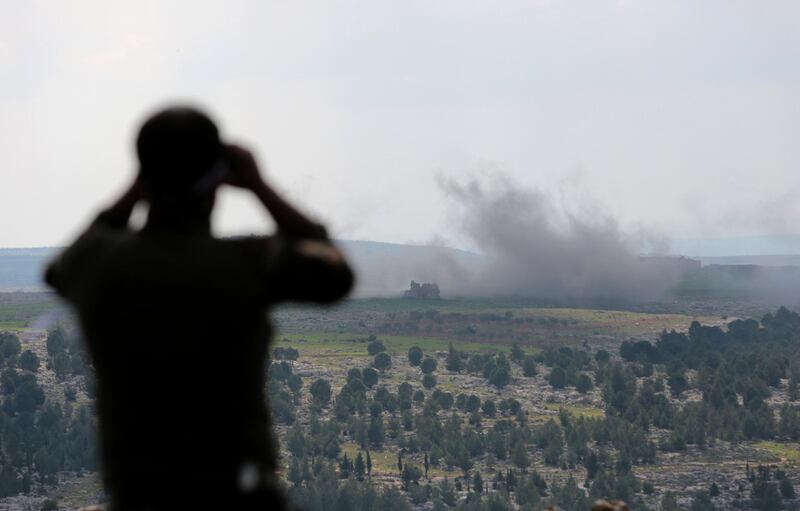Kidnapping and extortion by armed groups in the northern Syrian region of Afrin has shaken the area, with a spate of disappearances in recent weeks alarming residents.
The incidents come amid an intensified insurgent campaign by the Kurdish People’s Protection Units (YPG), who were forced out of Afrin by Turkey and allied rebel groups in March this year.
Videos showing the torture of kidnapped residents by armed groups have emerged over the past few weeks, accompanied by demands for ransom, in part of a growing pattern in the region currently ruled by Turkish-backed forces.
In one video made public this week, a handcuffed Kurdish resident of Afrin was shown being beaten with a large stick while he screams in pain. The footage was sent to the man’s family by the kidnappers along with a demand for $25,000 for his release.
In a separate incident on Tuesday, local media reported that a professor and Afrin resident named Riyad Mulla was taken by a masked gang near his home and has not been heard from since.
Turkey swept into Afrin earlier this year together with an array of allied rebel groups to capture the mainly Kurdish region from what it called “terrorists.” The YPG is an offshoot of the Kurdistan Workers’ Party, which has been fighting the Turkish state for greater autonomy for decades.
Operation Olive Branch, as it was dubbed by Ankara, led to the displacement of more than 100,000 people – mostly Kurds.
Turkey claims that 80,000 residents have returned to Afrin since it took control, but many more are to return, and in some cases the YPG is preventing others from going back.
Turkey’s continued presence in Afrin drew protests in New York this week as Recep Tayyip Erdogan arrived at the United Nations General Assembly.
In August, Amnesty International accused Turkey of turning a “blind eye” to abuses carried out by its Syrian allies on the ground. Since then, much of Turkey’s attention has been taken up by its efforts to stop a Syrian government offensive in Idlib, and it appears little has been done to prevent further abuses.
___________
Read more:
Some Syrians are returning home to arrests as others brave the sea
Gebran Bassil: Lebanon does not accept Syrians as 'refugees'
___________
“It’s outrageous that these violations continue to happen against civilians in Afrin, by the Turkish military and their allies on the ground,” said Leen Hashem, Syria campaigner for Amnesty International.
“It’s Turkey’s responsibility to end these practices and violations. Turkey has been calling for the protection of civilians in Idlib, so why do we not see that in Afrin?” she added.
Responding to the allegations at the time, a Turkish diplomatic source described the allegations as “unfounded,” adding that earlier reports of misdeeds “were promptly investigated and necessary measures were immediately taken by the Turkish Armed Forces”.
Separate investigations have also revealed widespread extortion in the region by Turkey’s allies. There are 13 million olive trees in the Afrin region, a major source of income for residents. The Syrian Observatory for Human Rights alleged this week that many olive farmers are being forced to pay a levy on their product, which is currently being harvested.
The report accuses rebel fighters who came to Afrin under the Turkish-named Operation Olive Branch of burning olive trees belonging to those who do not pay.
"Factions are burning olive plantations that belong to residents who refused to pay a royalty, and to warn other people who may reject of the same fate," the UK-based Observatory said.
The report added that the destruction of the trees “came against the backdrop of the seizure of most of the olive plantations in Afrin by the factions of Operation Olive Branch.”
Some farmers are being preventing from harvesting their trees for bureaucratic reasons, according to a former resident with family still living in Afrin.
"My uncle has some two or more thousand olive trees, his son is there in the village, but they didn’t allow him to harvest the olives under the pretext that the owner who the groves are registered in his name was not there,” said Arin, who fled her home in Afrin when Turkey captured the region.
But the Turkish-backed groups are not alone in using videos to stoke fear. The YPG has for the past few months been posting its own gruesome clips of targeted killings and assassinations of rebel fighters.
The latest, posted by the YPG’s Twitter account on September 21, showed its fighters open fire on a car in the darkness. The account said the operation killed five fighters belonging to the Turkey-backed Sultan Murad Brigades.
The Syrian Observatory said that by the end of August, the YPG had killed 108 rebel fighters in Afrin.





